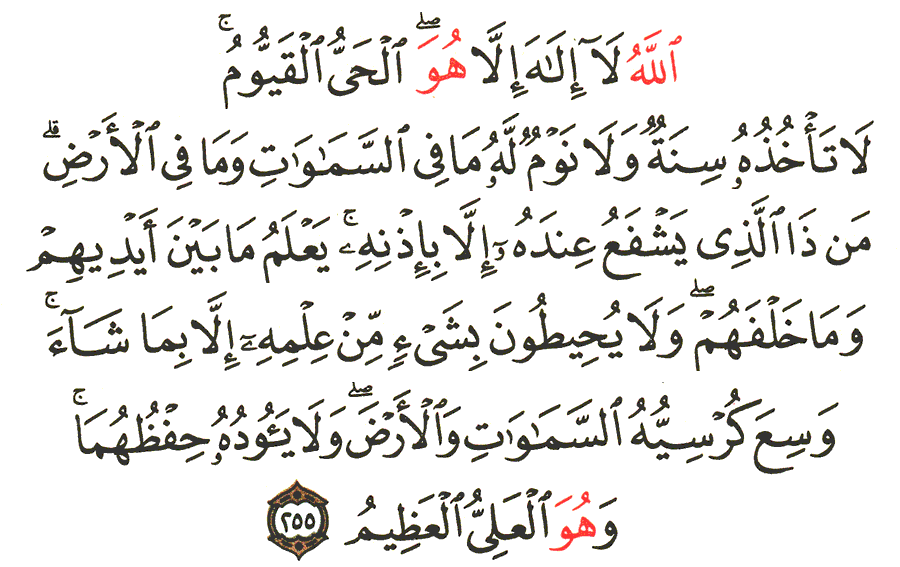Ayatul Kursi in Arabic English Hindi Urdu
The Holy Quran | surah Al-Baqarah | Ayatul Kursi Full With Translation Arabic English Hindi Urdu bangla (tarjuma), Surah Al-Baqarah aya (2:255) written for reading with the translation of the meanings in Arabic & English & Hindi & urdu translation .

- اللَّهُ لَا إِلَٰهَ إِلَّا هُوَ الْحَيُّ الْقَيُّومُ ۚ لَا تَأْخُذُهُ سِنَةٌ وَلَا نَوْمٌ ۚ لَهُ مَا فِي السَّمَاوَاتِ وَمَا فِي الْأَرْضِ ۗ مَنْ ذَا الَّذِي يَشْفَعُ عِنْدَهُ إِلَّا بِإِذْنِهِ ۚ يَعْلَمُ مَا بَيْنَ أَيْدِيهِمْ وَمَا خَلْفَهُمْ ۖ وَلَا يُحِيطُونَ بِشَيْءٍ مِنْ عِلْمِهِ إِلَّا بِمَا شَاءَ ۚ وَسِعَ كُرْسِيُّهُ السَّمَاوَاتِ وَالْأَرْضَ ۖ وَلَا يَئُودُهُ حِفْظُهُمَا ۚ وَهُوَ الْعَلِيُّ الْعَظِيمُ
Ayatul Kursi in roman english Transliteration
allāhu lā ilāha illā huw, al-ḥayyul-qayyụm, lā ta`khużuhụ sinatuw wa lā na`ụm, lahụ mā fis-samāwāti wa mā fil-arḍ, man żallażī yasyfa'u 'indahū illā bi`iżnih, ya'lamu mā baina aidīhim wa mā khalfahum, wa lā yuḥīṭụna bisyai`im min 'ilmihī illā bimā syā`, wasi'a kursiyyuhus-samāwāti wal-arḍ, wa lā ya`ụduhụ ḥifẓuhumā, wa huwal-'aliyyul-'aẓīm
Ayatul Kursi in English
Allah - there is no deity except Him, the Ever-Living, the Sustainer of [all] existence. Neither drowsiness overtakes Him nor sleep. To Him belongs whatever is in the heavens and whatever is on the earth. Who is it that can intercede with Him except by His permission? He knows what is [presently] before them and what will be after them, and they encompass not a thing of His knowledge except for what He wills. His Kursi extends over the heavens and the earth, and their preservation tires Him not. And He is the Most High, the Most Great."
Ayatul Kursi in Arabic اية الكرسي

English Türkçe Indonesia Русский Français فارسی تفسير Urdu آية الكرسي Ayatul Kursi in Urdu
اللہ، وہ زندہ جاوید ہستی، جو تمام کائنات کو سنبھالے ہوئے ہے، اُس کے سوا کوئی خدا نہیں ہے وہ نہ سوتا ہے اور نہ اُسے اونگھ لگتی ہے زمین اور آسمانوں میں جو کچھ ہے، اُسی کا ہے کون ہے جو اُس کی جناب میں اُس کی اجازت کے بغیر سفارش کر سکے؟ جو کچھ بندوں کے سامنے ہے اسے بھی وہ جانتا ہے اور جو کچھ اُن سے اوجھل ہے، اس سے بھی وہ واقف ہے اور اُس کی معلومات میں سے کوئی چیز اُن کی گرفت ادراک میں نہیں آسکتی الّا یہ کہ کسی چیز کا علم وہ خود ہی اُن کو دینا چاہے اُس کی حکومت آسمانوں اور زمین پر چھائی ہوئی ہے اور اُن کی نگہبانی اس کے لیے کوئی تھکا دینے والا کام نہیں ہے بس وہی ایک بزرگ و برتر ذات ہے
Ayatul Kursi in Bangla
আল্লাহ ছাড়া অন্য কোন উপাস্য নেই, তিনি জীবিত, সবকিছুর ধারক। তাঁকে তন্দ্রাও স্পর্শ করতে পারে না এবং নিদ্রাও নয়। আসমান ও যমীনে যা কিছু রয়েছে, সবই তাঁর। কে আছ এমন, যে সুপারিশ করবে তাঁর কাছে তাঁর অনুমতি ছাড়া? দৃষ্টির সামনে কিংবা পিছনে যা কিছু রয়েছে সে সবই তিনি জানেন। তাঁর জ্ঞানসীমা থেকে তারা কোন কিছুকেই পরিবেষ্টিত করতে পারে না, কিন্তু যতটুকু তিনি ইচ্ছা করেন। তাঁর সিংহাসন সমস্ত আসমান ও যমীনকে পরিবেষ্টিত করে আছে। আর সেগুলোকে ধারণ করা তাঁর পক্ষে কঠিন নয়। তিনিই সর্বোচ্চ এবং সর্বাপেক্ষা মহান।
Ayatul Kursi in Hindi
ख़ुदा ही वो ज़ाते पाक है कि उसके सिवा कोई माबूद नहीं (वह) जि़न्दा है (और) सारे जहान का संभालने वाला है उसको न ऊँघ आती है न नींद जो कुछ आसमानो में है और जो कुछ ज़मीन में है (गरज़ सब कुछ) उसी का है कौन ऐसा है जो बग़ैर उसकी इजाज़त के उसके पास किसी की सिफ़ारिश करे जो कुछ उनके सामने मौजूद है (वह) और जो कुछ उनके पीछे (हो चुका) है (खुदा सबको) जानता है और लोग उसके इल्म में से किसी चीज़ पर भी अहाता नहीं कर सकते मगर वह जिसे जितना चाहे (सिखा दे) उसकी कुर्सी सब आसमानों और ज़मीनों को घेरे हुये है और उन दोनों (आसमान व ज़मीन) की निगाहदाश्त उसपर कुछ भी मुश्किल नहीं और वह आलीशान बुजु़र्ग मरतबा है
Read: Surah Baqarah last 2 ayat
Tafsir Ayatul Kursi
Tafseer Tafheem-ul-Quran by Syed Abu-al-A'la Maududi
(2:255) Allah: the Everlasting, the Sustainer of the whole Universe; there is no god but He. *278 He does neither slumber nor sleep. *279 Whatsoever is in the heavens and in the earth is His. *280 Who is there that can intercede with Him except by His own permission.? *281 He knows what is before the people and also what is hidden from them. And they cannot comprehend anything of His knowledge save whatever He Himself pleases to reveal. *282 His Kingdom *283 spreads over the heavens and the earth and the guarding of these does not weary Him. He alone is the Supreme and the Exalted. *284
Allah - there is no deity except Him, the Ever-Living, the Sustainer meaning
. Irrespective of the number of gods or objects of worship set up by ignorant people, the fact remains that godhead in its entirety, belong's exclusively to the Eternal Being, Who is indebted to no one for His existence. In fact, He is not only self-existent, but upon Him rests the entire order of the universe. He alone wields all sovereign authority over His dominion. None shares either His attributes or His power and might, and no one has the same claims against the creatures as He. Hence, if anywhere in the heavens or the earth someone sets up anything or anybody as an object of worship and service (ilah) either instead of or in addition to the One True God this amounts to declaring war on reality.
*279). This is a refutation of the ideas of those who, in formulating their concepts of God, are inclined to consider God analogous to their own imperfect selves and hence ascribe to God the weaknesses characteristic of human beings. An instance at hand is the famous Biblical statement that God created the heavens and the earth in six days and on the seventh day He rested (see Genesis, chapters 1 and 2).
*280). To God belongs the heavens and the earth and everything therein. There is no one who shares anything with God in governance either of the heavens or of the earth. Any conceivable being other than God would necessarily be a part of the universe and thus belong to, and be a subject of, God rather than His partner and equal.
*281).This is a refutation of the ideas of those polytheists who consider either saints, angels or other beings to be so influential with God that if they were adamant in demanding something of Him, their demand would prevail. They are being told that, far from anyone having the power to impose his will on God, none - not even the greatest Prophets and the most highly esteemed angels - will dare utter one word in the majestic court of the Lord unless they are expressly permitted to do so.
*282). Here another blow is struck against polytheism. On the basis of the concept of God's unlimited sovereignty and omnipotence it was stressed, in the foregoing verses, that no one shares independently in God's governance of the universe, and no one is so powerful with God that his intercession would decisisely influence His judgement. The same point is stressed here but in a different manner. It is pointed out that no one possesses the knowledge that would enable him to comprehend the order of the universe and the considerations underlying it, so no one can legitimately interfere in its governance. The knowledge of human beings, of jinn, of angels and of all other creatures is limited and imperfect. No one's knowledge embraces all the facts of the universe. If someone did have the right to interfere even in only a part of the universe, and if his suggestions were of necessity to be put into eflect, the entire order of the universe would be disrupted. Creatures are incapable of understanding what is best for them, and do not have the capacity to know how best the universe should be governed. It is God alone Who knows everything.
*283). The Arabic term kursi signifies sovereignty, dominion and authority.
(The word Kursi has been variously interpreted by Muslim scholars. The literal meaning is obvious; it signifies that which one sits on. Scholars have differed, however, as to whether the word has been used in the Qur'an literally or figuratively. They have also disagreed whether the Kursi and 'Arsh Which occur in the Qur'an have one and the same meaning or are different. The main opinions expressed by the scholars are the following: (i) that Kursi signifies God's knowledge, a view attributed to Ibn 'Abbas; (ii) that it is identical with 'Arsh (Throne), a view attributed to Hasan al-Basri; (iii) that it signifies God's power (iv ) in opposition to such views a large number of scholars insist that Kursi should be considered a reality rather than be understood figuratively. In addition to many earlier scholars, this was vigorously championed by Ibn Taymiyah. It should be remembered, however, that Ibn Taymiyah and others who hold this opinion, side by side with affirming that Kursi is a reality, also emphasize that man has no knowledge about the nature and modality of Kursi and that it ought to be treated as something unique, being related to God Who is unique both in His essence and attributes. (See the commentaries of Alusi. Tabari, Qurtubi, Ibn Kathir and Shawkani on this verse. See also Ibn Taymiyah, Majmu al-Fatawa 1bn Taymiyah, vol. 5, pp. 55-8 and vol. 6, pp. 584-5. It is interesting to note that Sayyid Qutb, (martyred 1386 A.H/966 C.E.), a contemporary of Mawdudi and one of the most influential Islamic thinkers of our time, has interpreted the verse exactly, as Mawdudi did - Ed.)
*284). This verse is generally known as the 'Verse of the Throne' and it provides in one piece a knowledge of God without parallel.
The question that arises here is: What is the occasion for describing the Lord of the Universe and His attributes? In order to appreciate this one should rehearse the discourse beginning with verse 243 and continuing up to this point. In this discourse the believers were urged to strive with their lives and belongings to establish the true faith and were warned to get rid of the weaknesses which had characterized the conduct of the Israelites. A fundamental fact about war - that victory and success do not depend upon superiority in either numbers or weapons - was then indicated. They depend rather on faith, fortitude, discipline and firm resolution. Thereafter the Divine wisdom underlying fighting was disclosed, namely that God removes one set of people by means of another in order to maintain the good administration of the world. For were one group's dominance to be assured in perpetuity, the lives of all other human beings mould become miserable.
This was followed by the clarification of a misunderstanding which often arises in the minds of ignorant people. This misunderstanding arose from the false assumption that God had sent His Prophets so that all diversity and disagreement might come to an end. The people who accepted this premise, however, saw considerable diversity and disagreement, and were aware that falsehood existed side by side with Truth. They were agitated by the thought that this state of affairs might suggest helplessness on God's part, that He had failed to stamp out the evils He wanted to. In reply to this it was pointed out that it was not God's will to compel all human beings to follow one and the same way. Had it been so, man could not have deviated from the course set for him by God. This observation was followed by a passing reference to the subject with which the discourse opened. Finally, the point is made that no matter how many divergent beliefs, viewpoints, ways of life and conduct exist in actual life, the reality underlying the order of the universe is the one stated in this verse, and it remains unaffected by the misconceptions of people. On the other hand, however, it is not God's purpose to compel people to accept it. Whoever accepts it will find it to his own benefit; whoever rejects it, will find the result harmful.
List The Holy Quran | Surah Name: Al-Baqarah - Narrated by : Hafs from Asim
Ayatul Kursi pdf
Download Ayatul Kursi pdf

Recitation Quran
You can download the whole Quran with a translator or choosing another chapter in the list .
Download Quran
Download whole Quran : Download Koran .
Fahras Qur’an
Choose a surah from the following list : List of suras.
Download surah Al-Baqarah mp3 :
surah Al-Baqarah mp3 : choose the reciter to listen and download the chapter Al-Baqarah Complete with high quality
 Maher Al Muaiqly
Maher Al Muaiqly
 Mohamed Ayoub
Mohamed Ayoub
 Al Muhaisni
Al Muhaisni
 Muhammad Jibril
Muhammad Jibril
 Al Minshawi
Al Minshawi
 Al Hosary
Al Hosary
 Mishari Al-afasi
Mishari Al-afasi
 Nasser Al Qatami
Nasser Al Qatami
 Wadih Al Yamani
Wadih Al Yamani
 Yasser Al Dosari
Yasser Al Dosari









